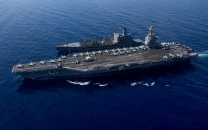Is the US defeated?
Different rivals used Afghanistan as a proxy to settle past scores and forestall future threats

Answering the question of who defeated the US is more important but elusive than the one given in the headline. To the ‘seeing is believing’ genre, it is the Taliban who forced the US out after fighting resiliently for 20 years; to the ones ‘scratching the surface’, it was the anti-Nato hidden alliance that made the impossible possible; and then there is ‘the world of intelligent agencies where the withdrawal may have an altogether different dynamics.
In this piece, one would prefer to focus on the first two and leave the third to conspiracy theories and imaginative stories published in books and circulated on social media. No one can contest the fact that Taliban overwhelmed the US and its Nato allies in the asymmetric war. The hit and hide tactics, which Taliban used so effectively, turned the tide against the flying-and-floating superpower. Having cultural affinity with locals in Pashtun belt and grown up in rugged terrains under harsh weather conditions, the Taliban fighters made the most secure insecure within a few months after their government was toppled in 2001.
Taliban’s steadfastness for two decades owes much to their religious beliefs coupled with Pashtun pride. They would narrate the stories of Ashaab-e-Rusool (SAW) or their ancestors to keep their spirits high whenever they lost their loved ones or faced other hardships. Appeal to national pride and eternal salvation in the hereafter, encoded in poems and songs, was used to boost up morale during periods of disorder and distress. Their foes, on the other hand, had technological superiority but no internalised bigger cause to fight for! Most analysts and serious scholars (the ones scratching the surface) look at the US debacle from a broader perspective and attribute the US failure in Afghanistan to its flawed foreign policy in South and Central Asia.
They believe the US created more enemies in the region than friends after 9/11 who did everything to send the US packing in humiliation. Pakistan was wary of the undue Indian presence in Afghanistan and believed it against its strategic interests. It was for this reason that Pakistan had to weigh in different options to protect itself from being sandwiched between two hostile neighbours. China, Russia and Iran were sternly against the US presence in Afghanistan despite sharing its concerns about terrorism. They wanted both the US and terrorist organisations to destroy each other. Different rivals used Afghanistan as a proxy to settle past scores and forestall future threats.
It was in a broader sense the Nato versus regional powers’ rivalry rather than the US-Taliban war in Afghanistan. Every regional power (excluding India) may have provided covert support to Taliban so as to make sure that Afghanistan would not become another Israel in the region. The relatively unrecognised enemy, which sucked in the US and eventually made the forever war unsustainable, was the systemic corruption permeated in military and civil institutions in Afghanistan.
Warlords, relatives of the rulers, and foreign companies (contractors and consultants) were all feeding on the war economy as parasites. Dollars flowed in apparently for counterterrorism, reconstruction, and nationbuilding went straight into the pockets of ministers, bureaucrats, and generals. Instead of serving the poor Afghans and working honestly for reconciliation, the rulers preferred to milk the cow as much as and for as long as they could. There are lessons for all countries, especially those with imperial designs and global outreach, to learn.
They should think many times before venturing into projects aimed at regime change and/ or exporting a particular model of governance to countries with different worldviews. Had the US thought through the idea of fighting Al-Qaeda in Afghanistan and Iraq holistically with all stakeholders on board, it would not have faced humiliation of the kind it experienced on August 14.
It erroneously assumed that Al-Qaeda and its benefactors (Taliban) would vanish in smoke after its ‘shock and awe’ attacks. It did not give serious thought to the complexity of socio-political situation on ground and multiplicity of players inside and outside Afghanistan with their conflicting objectives. Using military option should, therefore, be the last option even if one is as mighty as the US.














COMMENTS
Comments are moderated and generally will be posted if they are on-topic and not abusive.
For more information, please see our Comments FAQ